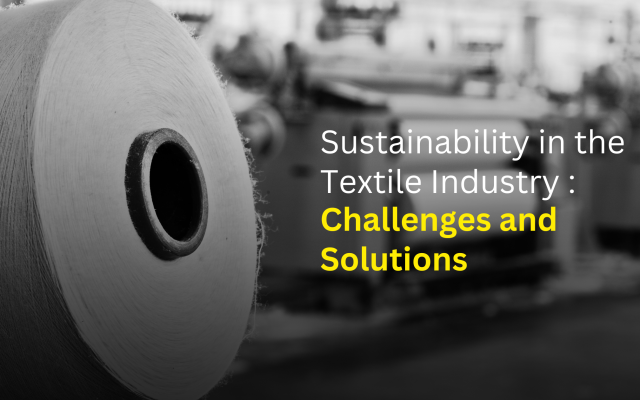In the evolving landscape of the textile industry, textile companies in India have emerged as global leaders, leveraging their rich history, advanced manufacturing capabilities, and growing focus on sustainability. The Indian textile sector is not only a major player in domestic markets but also contributes significantly to the global economy. As demand for high-quality textiles rises worldwide, India has positioned itself as a hub for innovation and production.
India’s textile market is vast, encompassing a wide range of products from traditional fabrics to modern synthetic materials. The strength of Indian textile companies lies in their ability to balance tradition with technology, which has led to their global success. With the growing influence of online trading portals, like Texchange Global, Indian textile firms are better equipped to connect with international buyers and expand their reach efficiently.
The Role of Technology in Enhancing India’s Textile Industry
Technological advancements have revolutionized how textile companies in India operate. From the integration of automated machinery in factories to sophisticated online platforms, Indian firms are adopting innovative solutions to stay competitive. A prime example is the increased use of data-driven strategies, which allow businesses to analyze trends and optimize their production processes.
With the rise of online textile trading, companies can now operate seamlessly, enabling buyers and sellers to engage in hassle-free transactions. Platforms like Texchange Global provide a marketplace for trading products such as Greige Yarn, Greige Knits, and Greige Woven, ensuring that both small and large businesses benefit from streamlined operations. This shift towards online trading is reshaping the industry’s future.
The Importance of Sustainability in the Indian Textile Sector
Another key factor contributing to the growth of textile companies in India is their commitment to sustainable practices. Global consumers are increasingly demanding eco-friendly and ethically sourced products. Indian textile companies, recognizing this shift, have embraced sustainable methods such as organic farming for cotton, recycling water in manufacturing processes, and using biodegradable packaging.
Companies that adopt sustainable practices not only meet international standards but also differentiate themselves in an increasingly competitive market. These initiatives help businesses reduce their carbon footprint while also appealing to environmentally conscious consumers, further strengthening their position in global markets.
Challenges Faced by Textile Companies in India
Despite their growing dominance, textile companies in India face several challenges that could hinder their growth. These include fluctuating raw material prices, intense competition from countries like China and Bangladesh, and the need for constant technological upgrades. To stay ahead, Indian firms must continue to innovate while maintaining cost efficiency.
Moreover, there are logistical challenges, particularly when exporting to global markets. Delays in shipping, customs regulations, and currency fluctuations can affect profit margins. However, the adaptability of Indian textile companies, coupled with the support from online platforms like Texchange Global, has enabled them to overcome these hurdles effectively.
The Growing Role of Online Textile Trading Platforms
In recent years, online platforms have emerged as essential tools for textile companies in India. Platforms like Texchange Global offer a wide range of services, from price transparency to secure payment methods, allowing businesses to trade with confidence. The ability to reach international buyers without geographical limitations has opened new revenue streams for Indian textile firms.
These platforms also provide valuable market insights through data analysis, helping companies tailor their products to meet global demand. For instance, businesses can track trends in Greige Yarn or Greige Woven and adjust their production based on consumer preferences, enhancing their market positioning.
Future Prospects of India’s Textile Industry
As the global demand for textiles continues to rise, textile companies in India are well-positioned to capitalize on this trend. The combination of a skilled workforce, access to raw materials, and government initiatives supporting the industry, such as “Make in India,” will ensure continued growth. Additionally, India’s strategic location offers logistical advantages for exports to key markets in Europe, the United States, and Asia.
By adopting technology, embracing sustainability, and leveraging online platforms like Texchange Global, Indian textile companies can further enhance their competitiveness. The future of the Indian textile industry looks promising, with increasing opportunities for expansion and innovation.
Conclusion: Why Fabric Suppliers Matter in the Global Textile Industry
As the industry evolves, fabric suppliers play an increasingly important role in ensuring that manufacturers have access to high-quality materials. In a market driven by consumer demand, reliable fabric suppliers are crucial for maintaining production efficiency and meeting deadlines. Indian textile companies, known for their ability to source quality fabrics, are in a prime position to cater to both domestic and international markets.
In conclusion, the future of textile companies in India is bright. By continuing to innovate and embrace sustainable and data-driven strategies, they can maintain their dominance in the global textile market. Whether you are a buyer or a seller, the opportunities within India’s textile sector are vast, and platforms like Texchange Global are here to support this growth.




